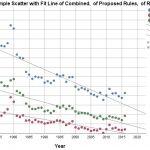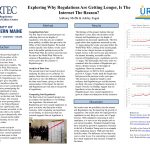By Visiting Associate Professor Anthony Moffa
 Lost in the noise of the Twitter-fueled, scandal-crazed, impeachment-curious media coverage lives the deregulatory agenda of the Trump Presidency. President Trump, like scores of politicians, pundits, policymakers, and even scholars before him, asserts that there are simply too many regulations and that some should be taken off the books. Often this criticism is accompanied by a compelling physical depiction of the so-called “books” – usually stacked, printed pages of the Code of Federal Regulations or the Federal Register.
Lost in the noise of the Twitter-fueled, scandal-crazed, impeachment-curious media coverage lives the deregulatory agenda of the Trump Presidency. President Trump, like scores of politicians, pundits, policymakers, and even scholars before him, asserts that there are simply too many regulations and that some should be taken off the books. Often this criticism is accompanied by a compelling physical depiction of the so-called “books” – usually stacked, printed pages of the Code of Federal Regulations or the Federal Register.

As is often the case, the data tells a somewhat different, and more complicated story, however. While the number of rules added to the Federal Register each year has actually been decreasing for decades, the average length of each of those individual regulations has grown, and continues to grow. That increase in complexity and length adds dreaded pages to the Federal Register at higher rates each year. Aside from this distinction between rules and pages, what critics also fail to acknowledge is that the movement towards longer and more detailed regulations could be rational, and largely unproblematic. Despite the fundamental importance of determining whether a relationship between length and some measure of effectiveness exists, no legal empirical study had directly addressed the issue.
I set out to fill that research gap through a collaboration with the Maine Regulatory Training and Ethics Center (MeRTEC) and the Undergraduate Research Opportunities Program (UROP) at the University of Southern Maine. Together with my undergraduate research assistant, Ashley Fagan (USM ’19), I collected data from the Office of the Federal Register, QuantGov, the Environmental Protection Agency (EPA), and the published opinions of the United States Courts of Appeals and the United States Supreme Court. The goal was to apply a neutral, empirical lens through which to evaluate how the trend towards increasingly complex rulemaking benefits administrative agencies, courts, and commentators.
My own tested two hypothesized rational explanations for longer regulations: (1) “the insulation hypothesis” and (2) “the socially beneficial hypothesis.” The insulation hypothesis posits that it makes sense for policymakers to increase the length of new regulations relative to previous regulations, because the additional pages provide more insulation from judicial review. The socially beneficial hypothesis posits using more words for each new rule is appropriate because longer regulations produce more net social benefits. In other words, if individual regulations have grown in order to increase the net social benefits they provide or to better insulate them from judicial review, then the trend towards longer rules would be justified. If, on the other hand, regulations have become needlessly loquacious, then perhaps a change of course is in order.
The results of my study will be published in full in a forthcoming article in the Nevada Law Journal. Empirical analysis of the data collected from EPA CAA rules confirmed the central claim of the socially beneficial hypothesis – longer rules have tended to confer more net benefits upon society. On the other hand, the data failed to confirm the insulation hypothesis. For policymakers the implications of these findings counsels an approach that estimates the costs and benefits of a proposed regulation early on in the process and then devotes resources (and Federal Register pages) to those rules that have the highest net benefits. Indeed, the numbers suggest this already happens. Pundits and commentators would do well to focus their scrutiny on the cost-benefit analyses underlying agency decisions, rather than the ultimate length of those decisions themselves. The results of this study should put some minds at ease, at least with respect to EPA regulations; they should also help better direct our scrutiny in the future. The negative results also suggest that simply making a rule longer will likely not better protect it from judicial review. Accompanying that arguably unsurprising conclusion is the more nuanced, and admittedly unproved, implication that should cause policymakers pause – perhaps devoting pages and pages in the Federal Register to exhaustively detailing the rationale for a given rule is not an efficient use of pulp, ink, and human resources. The empirical result (the lack of a statistically significant finding) should motivate scholars and commentators to further probe the utility of process requirements (judicially, legislatively, or administratively imposed) that add length and detail to Federal Register entries, particularly in the “Statement of Basis and Reasons.”

As part of the UROP program, Ashley had the opportunity to work with the data as well. The focus of her analysis was the effect of the internet, and the advent of regulations.gov, on the average number of Federal Register pages per rule. Ashley presented her conclusions at the University of Southern Maine’s Thinking Matters, a student research conference, on April 19, 2019.
This project advanced the empirical study of administrative law, adding to the important legal scholarship in the field, while providing an avenue for collaboration across programs within the University of Maine System. I am hopeful that there will be much more to come on both fronts in the future.
